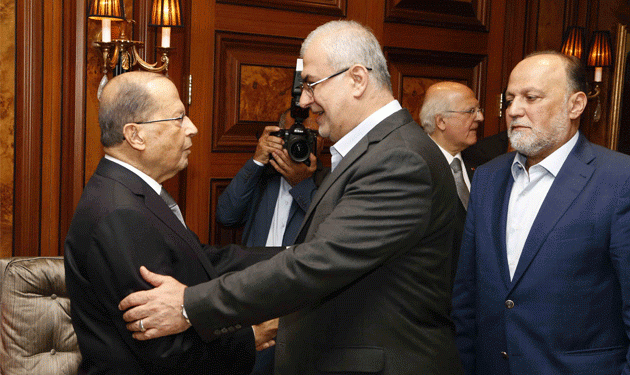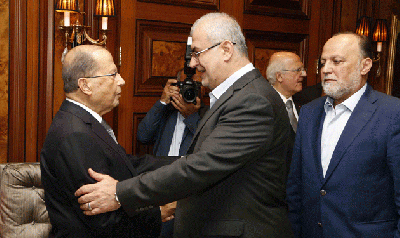Hezbollah granted President Michel Aoun what it has not given to any president before, not even to President Emile Lahoud. Aoun may well be the best example of the "honest promise," as the resistance's supporters like to describe the promises made by the party's Secretary-General, Sayyed Hassan Nasrallah. The presidential promise that Hezbollah made to Aoun was the main passage for him to the Baabda Palace, transforming the equation to "Aoun or no president," followed by the Maarab Agreement and Saad Hariri's support, paving the way to the presidential palace.
However, this promise came with grave repercussions for the "party," as Aoun's presidency turned into one of the worst in Lebanon's history regarding the crises witnessed, the historic collapse of the national currency and economy, state disintegration, and the alarming rise in poverty rates. The embarrassment was mutual throughout the six years, as the constant conflict and tension controlling the relationship between the Baabda Palace and Ain al-Tineh pushed the party several times to adopt positions contrary to its wishes to maintain the relationship with President Nabih Berri and the unity of the Shiite duo. "The teacher" is a red line for the "party," and it was not easy to abandon him in his battles with Aoun. Additionally, it could not relinquish Aoun and the Christian cover provided by the Free Patriotic Movement.
It should be noted that the "party" did not leave Berri alone, and perhaps the battle over the Minister of Finance and the fourth signature for the Shiite community is a good example of the processes involved in forming the four governments during the presidency. Conversely, Hezbollah was a constant source of embarrassment for the presidency, starting with the weaponry issue and Aoun's failure to build the state and institutions that he had often promised during his political career. However, the reality does not allow for a combination of state and armed factions. This, in addition to the significant disagreements with Arab countries due to the party's positions on Gulf states and the smuggling of Captagon to their territories, reached the point of severed relations and ambassador withdrawals following the statements of Minister George Kordahi and, before him, Minister of Foreign Affairs Charbel Wahba, which forced Aoun, on both occasions, to apologize to Arab countries. This embarrassment became public at the beginning of the last year of the presidency, where both Aoun and MP Gibran Bassil openly criticized Hezbollah, with Bassil stating clearly, "We have failed to build the state." The disagreement and media spat at that time escalated to the point of announcing the need to reconsider the Mar Mikhael Agreement after 16 years.
Of course, part of this discourse at that time carried a tone of political maneuvering, especially since Bassil believes he paid the highest price during the presidency due to the relationship with the party, following his inclusion on the U.S. sanctions list. He may have hoped to secure another honest promise similar to the one that brought the "general" before him to Baabda. The discrepancy between the party, the presidency, and the movement almost broke the bond of alliance between them, and this team nearly did not contest the 2022 elections on unified lists anew due to the disagreement between the "movement" and Berri. However, the "party" worked until the last moment to mend relations, resulting in a favorable outcome for the "movement" after a number of its deputies were elected with votes from this alliance in several districts.
Despite this underlying conflict, and at times overt, the "party" continued to back Aoun. It sold him the achievement of maritime border delineation, even though it played the most significant role in reaching this outcome, sometimes through drone messages and other times by direct oversight behind the scenes. However, the paradox was that Aoun completely ignored this role, failing to mention the "party" either directly or indirectly in his announcement of Lebanon's approval of the delineation agreement, despite distributing "thanks" widely. This time, the tripartite slogan of the army, people, and resistance, on which he had built much of his discourse in the early years of his presidency and in the ministerial statements of his governments, was notably absent from his speech. For the sake of negotiations and to avoid embarrassing Aoun in front of the Americans, the "party" perhaps grudgingly overlooked its omission from the presidential thank-you letter, following the saying "He who swallows the sea does not choke on the stream," always adhering to the principle of "For your eyes, General."




